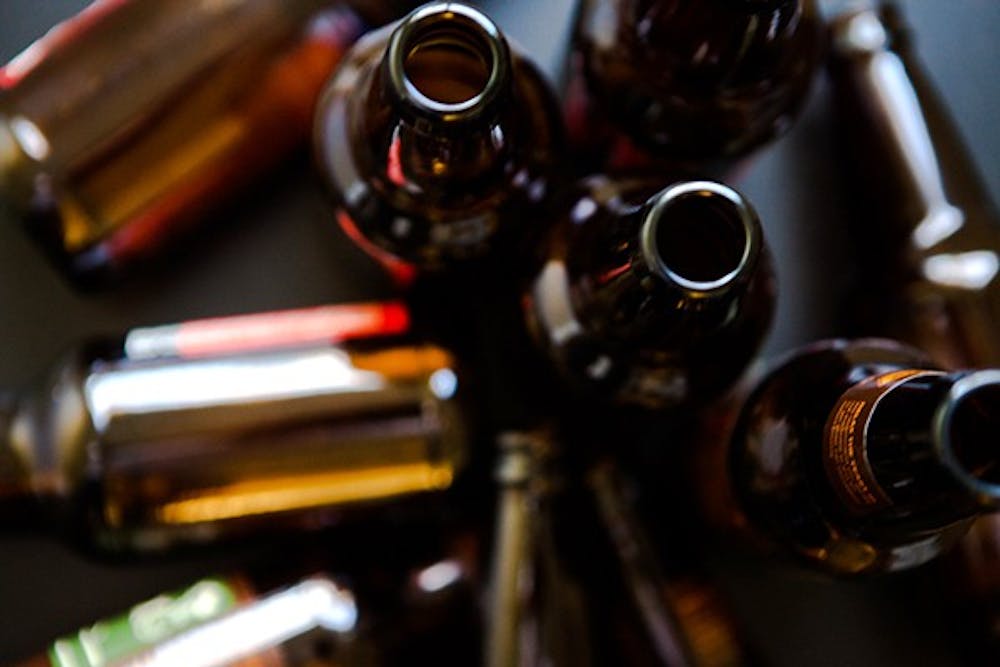
Underage drinking was heavily targeted by the safe and sober program. (Photo by Ryan Liu)
New analysis of the Safe and Sober program suggests the University continues to struggle with preventing sexual violence against off-campus students.
Tempe Police implemented the Safe and Sober campaign in August and September and closely targeted the Loud Party Corridor, a neighborhood east of ASU’s Tempe campus. Primarily inhabited by ASU students, the area struggles with underage drinking and violent crime.
ASU Health and Wellness Director Karen Moses said Safe and Sober had goals to not only reduce the number of loud party calls, but also lower instances of violent crimes reported in the area.
“In October alone, there were 211 fewer loud party calls in Tempe compared to the typical (average) calls for October over the previous four years,” she said in an email. “The greatest reduction in violent crime was of robberies being reduced from 17 to 4 in the area targeted by Safe and Sober.”
The program failed to lower the number of sexual assault cases reported in the area.
Tempe Police Sgt. Michael Pooley worked on the planning and implementation of this initiative since May 2013. Although he is proud of the results law enforcement achieved, he acknowledged the difficulties in preventing sexual violence against college students.
“Most of these crimes occur in people’s residential buildings,” he said. “Obviously, we can’t get into peoples’ houses. But we’re always looking at new ways to reduce that number, and it’s something we’re trying to work on.”
ASU spokeswoman Julie Newberg said the University supports the operation.
“The University and the city continue to work together in partnership to ensure a safer community,” she said in an email.
However, ASU did not officially participate in Safe and Sober.
Pooley said multiple law enforcement agencies joined the effort, but the University chose to remain out of the program.
“We included ASU in all the planning,” he said. “We tried to coordinate with them, and we shared a lot of information. We invited them.”
Although the institution did not officially contribute to Safe and Sober, multiple student organizations at ASU are actively working toward reducing sexual assault incidents on and off campus.
Biological science senior Casey Peterson is the Women’s Health subcommittee chair for the Health and Counseling Student Action Committee at ASU. She said she thinks Tempe Police were unsuccessful in reducing the number of sexual assault cases, because law enforcement is targeting the wrong problem facing ASU students.
“I think the main issue is that we try to stop the instances of drinking, but no program is ever going to be perfect in stopping that,” she said. “We’re not focusing on protecting people. I know all the drinking is never going to stop, so let’s protect people while they’re doing these things.”
Peterson said she believes student organizations can do more than the University can to protect students from sexual violence.
“There’s a lot of politics and things like that, with ASU being a dry campus,” she said. “But the real power and the real protection for people is going to come from the students and student organizations. We’re the ones that really have the power to change things on (the) ASU campus.”
Another organization at ASU that educates students on sexual wellness is I ALWAYS Get Consent! Founded by Jaclyn Raymond, a social justice and human rights graduate student, IAGC has a four-year history at ASU of hosting events on campus that encourage an open dialogue on sexual violence.
“The ultimate goal is a campus culture shift where consent and sexual wellness is respected,” Raymond said. “We want to teach (students) what consent is and what rape looks like on our campus.”
This past year, more than 1,000 students on the Tempe campus signed a form sponsored by IAGC where they agreed to get consent before engaging in any sexual activity. Raymond said projects such as these may not be able to stop sexual violence from occurring, but they bring awareness to serious issues on campus.
To get these events off the ground, IAGC worked with multiple student organizations and university programs, including the Residence Hall Association, Undergraduate Student Government and ASU Wellness. However, Raymond said she thinks more can be done to curb sexual violence.
“I’m told that there are a lot of internal and systematic changes that are happening (at ASU),” she said. “There are good things happening, and there is room for improvement.”
Looking ahead to the next school year, Pooley expects that Tempe Police and other law enforcement agencies will conduct similar programs to control crime at the University. He said he is optimistic that ASU will officially commit to similar initiatives in the future.
“We’ll bring all our resources to the table,” he said. “Again, ASU will be invited. I imagine they’ll partner with us very closely this year and help coordinate our efforts. This is what the hope is.”
ASU Police and ASU Counseling Services could not be reached for comment.
Reach the reporter at shari.rose@asu.edu or follow her on Twitter @sharir55




